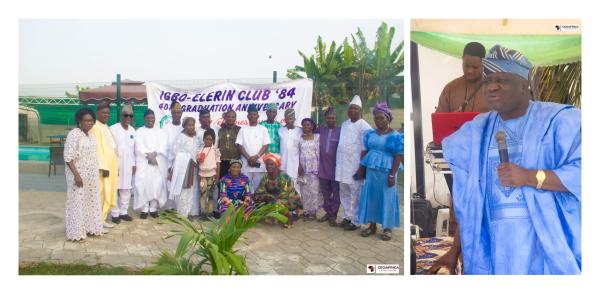
The Igbo-Elerin Club '84 marked a significant milestone with the celebration of their 40th Graduation Anniversary on Saturday, December 21st 2024, at Water Field Luxury Hotel in Akobo, Ibadan. The event brought together accomplished alumni from the graduating class of 1984 and distinguished guests to honor their shared journey and the impactful contributions of the club members to society over the past four decades.
The highlight of the evening was the thought-provoking lecture delivered by the esteemed Professor Isaac Olawale Albert, a leading figure in Peace, Security & Humanity Studies at the University of Ibadan. His lecture titled, "Nigeria’s development crisis and the way forward”. He urged alumni of the Igbo-Elerin Club '84 to take an active role in addressing the nation's pressing issues. Speaking at the club’s 40th graduation anniversary, he emphasized that Nigeria is at a critical juncture that demands introspection and action.
Professor Albert lamented the stark contrast between Nigeria's potential and its current state, describing it as an "Oxymoron." Once hailed as the "Giant of Africa," Nigeria is now grappling with severe socio-economic challenges, leading to the grim label of being the "Capital of Power Poverty" in the world. He painted a vivid picture of the struggles faced by many Nigerians, stating, "People are dying while struggling to eat."
The professor's call to action resonated deeply, highlighting the crucial role of the alumni—many of whom are influential professionals in various fields. "If Nigeria will do better and overcome all the problems we are facing, it is in our hands," he asserted, urging collective responsibility among the '84 set.
Albert noted the paradox of Nigerian society, where citizens express a desire to respect the law but often lose faith in the system due to the actions of their leaders. "Nigerians are ready to respect laws, but they are looking for those who will lead the process. If leaders aren't willing to respect the laws of the land, it becomes very difficult for citizens to obey rules."
This critical perspective challenges both leaders and citizens to reflect on their roles in fostering a more prosperous and equitable Nigeria. The gathering concluded with a renewed commitment among attendees to advocate for change and to engage in nation-building efforts, signaling a collective determination to restore Nigeria's former glory.
Professor Olawale Albert, known for his engaging speaking style and profound insights, spoke with CEOAFRICA in an exclusive interview; he emphasized the critical role that alumni associations play in the development of their communities. Prof. Albert noted that Igbo-Elerin Grammar School was established by the government, but he stressed that it is now the responsibility of its alumni to reflect on their experiences and contributions to the society they emerged into. "The prominent individuals who have gathered to form the alumni association must look back and acknowledge that where we are today is the result of the education we received at this school," he stated. He urged them to consider how they can give back, reinforcing the notion that helping the school is intrinsically linked to supporting the broader community.
Highlighting the significance of the gathering, he remarked, "What we are doing today is of national importance. The government, which established the school, cannot carry this burden alone. It is essential for all beneficiaries of the school to unite in their efforts to support it." Prof. Albert encouraged the 1984 graduates to not only reunite for nostalgia but to actively plan how they can contribute to the school. "I advise this '84 set to come together to make Igbo-Elerin a better institution. They need to pool their resources and provide assistance to the school," he asserted.
He also highlighted the need for mentors to guide current students in their educational and career choices. "We need people to engage with this school and educate students on how to plan their careers and choose the right courses as they prepare for university," he added.
Albert further expressed deep concerns regarding the state of primary and secondary education in Nigeria. He emphasized that, despite significant global investments in educational systems, Nigeria's schools are not meeting the necessary standards for nurturing future leaders.
"The lack of quality education in our primary and secondary schools is alarming," he stated. "I struggle to understand the mindset of our leaders, especially when considering that effective leadership cannot emerge from individuals who have been neglected in their formative educational years."
The education expert highlighted that a nation's ability to thrive hinges on its commitment to cultivating its younger population. He lamented the dire condition of public schools across Nigeria, stressing that the country cannot hope to progress without first addressing the educational crisis. He advised the government to recognize that the future of the nation is not left to chance but should be shaped through strategic planning. "We must calculate our educational goals to ensure that in the next decade, we are producing students capable of advancing Nigeria into the industrial age," he urged.
He called on state officials to increase their investments in primary and secondary education, asserting that such initiatives are crucial for building a prosperous future generation. Without immediate action, he warned, Nigeria risks falling further behind in an increasingly competitive global landscape.
In an interview with CEOAFRICA, Professor (Mrs.) Bolatito Lanre- Abass, a distinguished lecturer in the Philosophy Department at the University of Ibadan, emphasized the critical role of alumni in supporting their alma maters amid the challenges of education in Nigeria, she commends the alumni of Igbo-Elerin Grammar School for their dedication and commitment to the school's success.
Highlighting the pressing issue of unemployment in the country, Professor Abass noted that while many graduates face difficulties securing jobs, this should not deter those in advantageous positions from giving back to their schools. “We must recognize that many public schools are in a state of disrepair, and it's essential that alumni step up to contribute in various ways,” she remarked. She stressed that government support alone is insufficient for the revitalization of these institutions, underscoring the responsibility of former students to invest in their educational foundations.
Reflecting on the varying policies of different state governors, Professor Abass acknowledged the initiatives undertaken by past and present leaders in Oyo State. She praised the efforts of former Governor Abiola Ajimobi, who implemented numerous beneficial policies during his tenure. She also commended the current governor, Seyi Makinde, for his ongoing commitments to education and healthcare that aim to uplift the community.
Professor Abass, an active participant in Igbo-Elerin Grammar School’s events, advocates for more alumni-focused gatherings across schools in promoting alumni engagement and fostering a sense of community for the betterment of all.
Alhaji Sikiru Olawale Ajila, a distinguished alumnus, expressed deep gratitude for the profound influence the institution has had on its students. Speaking in an interview, Ajila highlighted the school's crucial role in shaping the moral compass and societal relevance of its alumni.
“When we gained admission to Igbo-Elerin Grammar School in 1979, we were thoroughly prepared for the challenges life would present,” said Ajila. "The education we received was not only academic but also instilled in us a sense of responsibility and purpose."
He proudly noted that many members of the '84 set have attained significant success in their respective careers, attributing much of that achievement to the strong foundation laid by the school. “If there is any way we can give back to the school and add value, we must recognize its importance," he urged. “This school is our foundation, and without it, we wouldn’t be where we are today.”
The ceremony served as a powerful reminder of the lasting impact educational institutions have on their alumni and the responsibility they bear in fostering growth within their communities.
The evening was filled with nostalgia as members reminisced about their time in school, the friendships formed, and the lessons learned. Numerous alumni took the stage to share their individual journeys since graduation, highlighting the diverse fields in which they have excelled and the collective achievements they have all acquired.






















